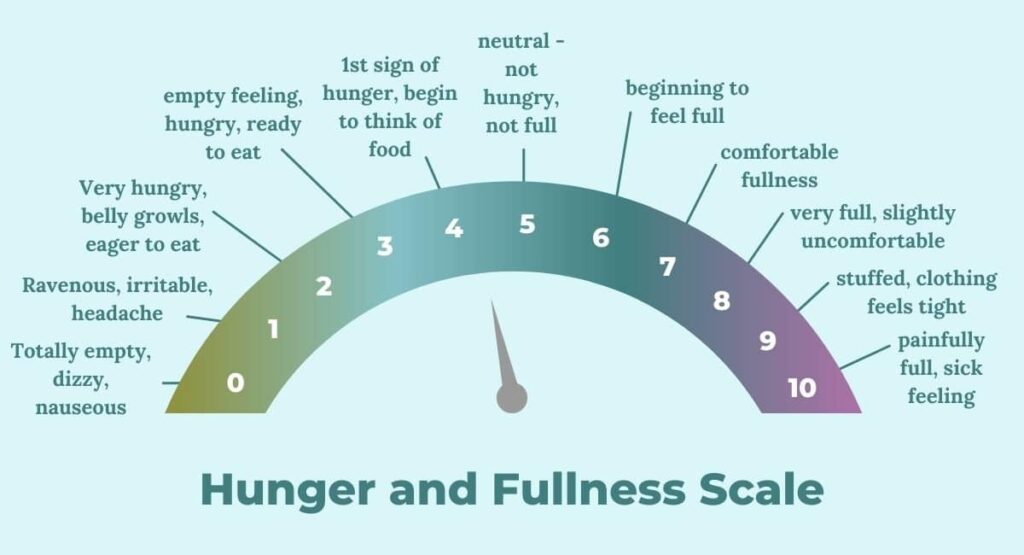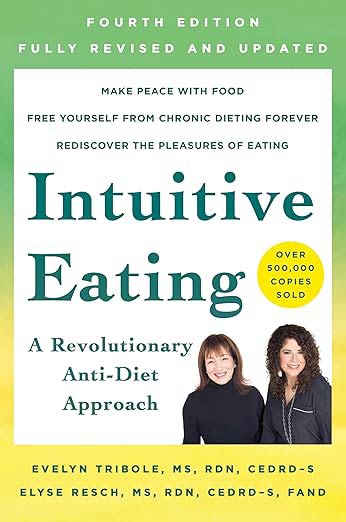We continue our journey this month with the 10 Principals of Intuitive Eating, in case you missed it. Just to quickly reiterate, authors Evelyn Tribole, and Elyse Resch first published their book The 10 Principles of Intuitive Eating in 1995 and since has been pivotal in the world of eating disorder treatment and the anti-diet-culture. Now in it’s 4th edition, it continues to be a popular and life-changing approach for so many – including us!
To honor your hunger is to recognize and respond to your body’s biological cues for nourishment without judgment or delay. It sounds simple, but in a culture or society where hunger is often seen as a sign of weakness or something to suppress, learning to trust and respect can be a radical shift. An example of judging one’s hunger would be something like “oh man, I’m so bad for wanting another slice of pizza/cake, what is wrong with me?”
Hunger is not the enemy—it is a biological signal that your body needs energy. Just like thirst tells you when to drink water or fatigue signals the need for rest, hunger is your body’s way of saying, “I need fuel to function.” We call these cues from our body and honoring them – interoceptive awareness. When we feel the need to pee, we should find the nearest bathroom. Seems pretty simple, by design, but we often ignore and judge our bodies signals.
Ignoring hunger can lead to intense cravings, overeating, and a sense of loss of control around food. On the other hand, honoring hunger helps rebuild body trust, stabilizes mood and energy levels, and creates a foundation for more attuned eating. Addressing binge/over eating behaviors is done so by this principle as the foundation. I remember working at a binge eating program. The participants were shocked by how hearty our breakfasts were, but we reminded them that this is a meal that needs all components to avoid feeling overly hungry later on in their day.
The Diet Culture Disconnect
Many people have become detached from their hunger cues due to years of dieting, intermittent fasting, or rigid eating schedules. Diet culture teaches us to fear hunger, labeling it as something to control or suppress with tricks like drinking water, chewing gum, or distracting ourselves. These strategies may override the immediate sensation, but they do not address the underlying need—and they often lead to cycles of deprivation and bingeing.
In contrast, intuitive eating acknowledges hunger as morally neutral—not “bad” or “good”—just a signal that deserves to be honored.
Types of Hunger
Tribole and Resch identify several types of hunger, but Principle 2 is primarily concerned with biological hunger, the physical drive to eat that comes from your body’s need for energy. Signs of biological hunger include:
- Stomach growling or emptiness
- Irritability (“hangry” feelings)
- Trouble concentrating
- Headaches or lightheadedness
- Low energy or fatigue
The goal is to tune into these signals early, before reaching the point of ravenous hunger. When we wait too long to eat, we’re more likely to eat quickly and with less satisfaction, which can disconnect us further from our body’s needs.

What Would Your Eating-Disorder Informed Therapist Say?
Reconnecting with hunger takes time, especially for those who’ve spent years ignoring or suppressing it. Here are a few practices to help you tune in:
- Check in regularly – Ask yourself throughout the day: “How hungry am I right now?” Using a hunger-fullness scale (from 1 = starving to 10 = overly full) can help develop awareness.
- Respond early – Don’t wait until you’re ravenous to eat. Try eating when you feel gently hungry—around a 3 or 4 on the scale—so you can eat with intention and satisfaction.
- Keep nourishment accessible – Life gets busy. Having snacks or meals readily available makes it easier to respond to hunger promptly.
- Challenge guilt – If eating when hungry brings up guilt or anxiety, gently question those beliefs. Remind yourself: Eating when hungry is a normal, necessary act of self-care.
Why Honoring Hunger Matters
This principle lays the groundwork for the rest of the intuitive eating process. Without consistent nourishment, it’s difficult to stop eating when full (Principle 5), cope without food (Principle 7), or reject the diet mentality (Principle 1). Honoring hunger builds body trust, which is essential to healing from disordered eating patterns and developing lasting food freedom.
Final Thoughts
In a culture that prizes willpower and control, listening to your body may feel counterintuitive. But intuitive eating isn’t about doing what’s easiest—it’s about doing what’s right for your body and your well-being. By honoring your hunger with curiosity and compassion, you take an essential step toward reclaiming your autonomy around food—and fostering a more trusting, peaceful relationship with your body.
As Tribole and Resch emphasize: “Keep your body biologically fed with adequate energy and carbohydrates. Otherwise you can trigger a primal drive to overeat. Once you reach the moment of excessive hunger, all intentions of moderate, conscious eating are fleeting and irrelevant.”
In other words: Your hunger is not a problem to fix—it’s a messenger to listen to. Start honoring it today.
If you feel like you would like to have a further discussion on this topic, please contact our team to schedule a session.
Resources:
We keep a full list of resources on anti-diet culture and body dissatisfaction work on our website. Check out our comprehensive list here.


